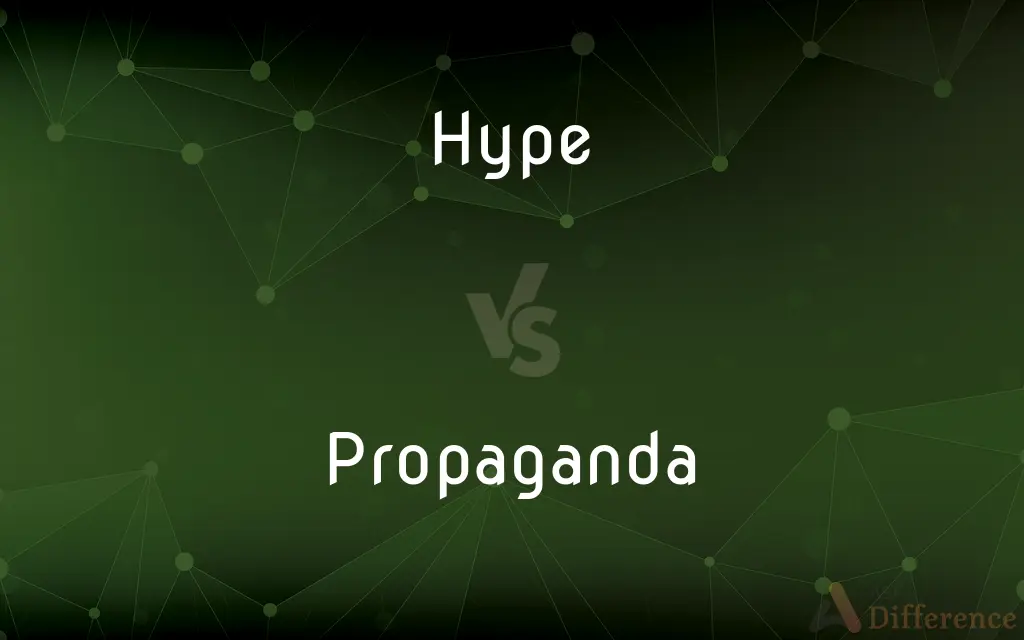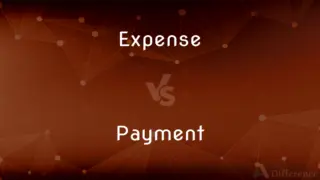Hype vs. Propaganda — What's the Difference?
By Tayyaba Rehman & Urooj Arif — Updated on April 17, 2024
Hype is promotional enthusiasm, often exaggerated, to create buzz, while propaganda is biased information spread to promote a political cause or point of view.

Difference Between Hype and Propaganda
Table of Contents
ADVERTISEMENT
Key Differences
Hype is a marketing tool used to generate excitement and interest in a product, service, or event through enthusiastic, often exaggerated, communication. On the other hand, propaganda aims to influence the public's opinion or behavior to support a specific political agenda or ideology.
While hype primarily focuses on positivity and excitement to attract consumers or audiences, propaganda often manipulates facts or employs emotional appeals to shape beliefs and attitudes more deeply.
Hype is commonly seen in advertisements, product launches, and entertainment to boost sales or popularity, whereas propaganda is more prevalent in political contexts, during wars, or in governmental communications.
On one hand, the effects of hype are usually short-lived, aiming to spike interest and immediate reactions. On the other hand, propaganda seeks to instill long-term attitudes and can sometimes contribute to societal division.
Hype uses modern marketing channels like social media, influencers, and viral campaigns effectively, while propaganda might use state-controlled media, educational systems, and official communications to spread its messages.
ADVERTISEMENT
Comparison Chart
Purpose
To generate excitement and interest
To influence public opinion for a political cause
Duration
Short-term, often for immediate impact
Long-term, aims for lasting influence
Methods
Advertising, viral marketing, social media
Media control, speeches, educational materials
Main Usage
Consumer products, entertainment
Politics, government agendas
Emotional Appeal
Generally positive, exciting
Can be positive or negative, often deep-seated
Compare with Definitions
Hype
To intensify or increase interest artificially.
The company hyped its new product line to attract investors.
Propaganda
Material disseminated by the advocates of a doctrine.
He wrote articles that served as propaganda for his beliefs.
Hype
To create or stir up interest in by means of exaggerated talk or advertising.
They hyped the product with flashy commercials.
Propaganda
The dissemination of propaganda as a political strategy.
The government’s propaganda machine was in full swing during the election.
Hype
Excessive publicity; promotional buzz.
The hype surrounding the new movie made it a box-office hit.
Propaganda
The practice of producing and spreading propaganda.
Propaganda was his tool to influence public opinion.
Hype
A deception carried out for the sake of publicity.
The event was more hype than substance, disappointing many.
Propaganda
Information, especially of a biased or misleading nature, used to promote a political cause or point of view.
The leaflets were pure propaganda promoting the regime.
Hype
Enthusiastic praise especially to promote interest.
The novel received a lot of hype before its release.
Propaganda
A form of communication aimed particularly at influencing the attitude of a community.
The documentary served as propaganda for the cause.
Hype
Excessive publicity and the ensuing commotion
The hype surrounding the murder trial.
Propaganda
Propaganda is communication that is primarily used to influence an audience and further an agenda, which may not be objective and may be selectively presenting facts to encourage a particular synthesis or perception, or using loaded language to produce an emotional rather than a rational response to the information that is being presented. Propaganda is often associated with material which is prepared by governments, but activist groups, companies, religious organizations, the media, and individuals also produce propaganda.
Hype
Exaggerated or extravagant claims made especially in advertising or promotional material
"It is pure hype, a gigantic PR job" (Saturday Review).
Propaganda
The systematic propagation of a doctrine or cause or of information reflecting the views and interests of those advocating such a doctrine or cause.
Hype
An advertising or promotional ploy
"Some restaurant owners in town are cooking up a $75,000 hype to promote New York as 'Restaurant City, U.S.A.'" (New York).
Propaganda
Material disseminated by the advocates or opponents of a doctrine or cause
Wartime propaganda.
Hype
Something deliberately misleading; a deception
"[He] says that there isn't any energy crisis at all, that it's all a hype, to maintain outrageous profits for the oil companies" (Joel Oppenheimer).
Propaganda
A concerted set of messages aimed at influencing the opinions or behavior of large numbers of people.
Hype
A hypodermic injection, syringe, or needle.
Propaganda
A congregation of cardinals, established in 1622, charged with the management of missions.
Hype
A drug addict.
Propaganda
Hence, any organization or plan for spreading a particular doctrine or a system of principles.
Hype
To publicize or promote, especially by extravagant, inflated, or misleading claims
Hyped the new book by sending its author on a promotional tour.
Propaganda
Information that is spread for the purpose of promoting some cause
Hype
To stimulate or excite. Often used with up
All that coffee really hyped me up. The kids were hyped up even before the party began.
Hype
(marketing) Promotion or propaganda; especially exaggerated claims.
After all the hype for the diet plan, only the results ended up slim.
Hype
(transitive) To promote heavily; to advertise or build up.
They started hyping the new magazine months before its release.
Hype
Blatant or sensational promotion
Common Curiosities
Is propaganda always negative?
Propaganda can have negative connotations, but it can be used neutrally depending on the intent and context.
How do companies use hype effectively?
Companies use hype through marketing strategies such as pre-launch teasers, influencer endorsements, and viral campaigns.
What are typical mediums used for spreading propaganda?
Typical mediums include state-controlled media, public speeches, and educational systems.
How does social media affect the spread of hype?
Social media amplifies the spread of hype by enabling rapid and widespread dissemination of promotional content.
What is the difference between hype and normal advertising?
Hype involves more extravagant or exaggerated promotion compared to standard advertising.
How does propaganda differ from misinformation?
Propaganda is purposefully biased to influence opinions, while misinformation may be unintentionally false.
Can hype be considered a form of propaganda?
While both can influence opinions, hype is generally commercial and less ideologically driven than propaganda.
What is the primary goal of hype?
The primary goal of hype is to generate immediate interest and excitement.
What historical examples demonstrate the use of propaganda?
World War II era posters and broadcasts are classic examples of propaganda.
Can propaganda be found in democratic societies?
Yes, propaganda can be present in any society, including democracies, often as biased political messaging.
Share Your Discovery

Previous Comparison
Expense vs. Payment
Next Comparison
Covenant vs. ContractAuthor Spotlight
Written by
Tayyaba RehmanTayyaba Rehman is a distinguished writer, currently serving as a primary contributor to askdifference.com. As a researcher in semantics and etymology, Tayyaba's passion for the complexity of languages and their distinctions has found a perfect home on the platform. Tayyaba delves into the intricacies of language, distinguishing between commonly confused words and phrases, thereby providing clarity for readers worldwide.
Co-written by
Urooj ArifUrooj is a skilled content writer at Ask Difference, known for her exceptional ability to simplify complex topics into engaging and informative content. With a passion for research and a flair for clear, concise writing, she consistently delivers articles that resonate with our diverse audience.
















































